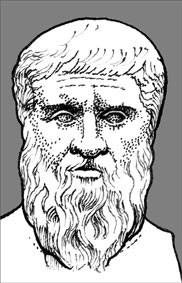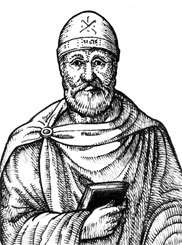The Trinity—Conceived in Philosophy
Next Part Gnosticism
Back to The Trinity
Back to By David C. Pack
Before examining the dominant philosophy of the second to fourth centuries A.D., we must focus on the famous Greek philosopher Plato (427-327 B.C.) and his attempts to define God. Most Greek philosophy was based on Plato’s theories, later developing into Middle Platonism and eventually Neo-Platonism. All other philosophical schools of Greek origin, such as the Pythagoreans, were greatly influenced by Platonism.
Plato is considered the greatest and foremost of all philosophers. He produced many famous works, including The Republic, in which his ideas were presented in the form of dramatic dialogues. His central dogma asserted that the “ideal” forms an absolute and eternal reality, and that this physical world is but an imperfect and transitory reflection. (If this seems difficult to understand, remember, Plato was a philosopher, and such “thinkers” are generally not concerned with or even supposed to be understood by those deemed “uneducated.”)
Since the concept of triad deities permeated all ancient religions, Plato was deeply ingrained with trinitarian thought. He sought to better define the Creator by elevating this Being above the host of other deities in Greek mythology. His definition consisted of: (1) The “first God,” who was the Supreme Being in the universe; (2) the “second God,” whom Plato described as the “soul of the universe”; and (3) the “third God,” defined as the “spirit” (Gods and the One God, Grant, ch. 12). Ignoring the Bible, men came to regard Plato’s definition as mankind’s best effort to define God.
Philo
Another individual bearing significant influence upon the popular developing trinitarian thought during the second through fourth centuries was Philo, a theologian of Alexandria, Egypt, who lived circa. 20 B.C. to 50 A.D. For centuries to follow, this Jewish philosopher’s influence upon Jewish thought was profound.
Though greatly influenced by Plato, Philo’s version of trinitarian thought was unique. He defined God as: (1) The Father, who created all things (whom Philo calls “the Demiurge”); (2) the Mother, who was the Knowledge that the Maker possessed; and (3) the only beloved Son—this world (Ibid.). In this human-reason-laced definition, the union of Demiurge and Knowledge produced man’s world.
Such is philosophy—but it is this kind of esoteric thinking that bore heavily on the birth and development of the trinity!
This triad differed somewhat from Plato’s version, yet was conceived by Philo’s lifelong focus on Greek philosophy. His blending of Platonism and Stoicism set the course of Christian philosophy, and this is demonstrated in the following overview: “In Greek philosophy …Philo…chiefly follows the Platonic doctrine of Ideas and the Soul of the World, and the Stoic doctrine of God as the…Reason operative in the world. In its Stoic form the latter doctrine was pantheistic, but Philo could adapt it to his purpose simply by drawing a sharper distinction between the Logos and the world” (Encyclopedia Britannica, 11th ed., vol. 21, p. 411).
Alexandria was the source of Hellenistic influence upon the Jews. Note: “For here the Jews began to busy themselves with Greek literature even under their clement [lenient] rulers, the first Ptolemies, and here the law and other Scriptures [Septuagint] were first translated into Greek; here the process of fusion began earliest and proceeded with greatest rapidity; here, therefore, also the Jews first engaged in a scientific study of Greek philosophy and transplanted that philosophy to the soil of Judaism” (Ibid., p. 409).
To appreciate how Greek philosophy influenced Philo, consider: “Philo certainly, to judge by his historical influence, was the greatest of all these Jewish philosophers, and in his case we can follow in detail the methods by which Greek culture was harmonized with Jewish faith…Philo’s closest affinities are with Plato, the later Pythagoreans and the Stoics.”
Also note that “in whole the substance of his philosophy the Jewish point of view is more or less completely modified—sometimes almost extinguished—by what he has learned from the Greeks…their influence on Philo is nowhere more strongly seen than in the detailed development of his doctrine of God” (Ibid., p. 409-410).
Of course, Philo’s monotheism derived from Judaism, although reinforced by Plato. Philo’s common bond to Greek philosophy also made him a significant influence in Christian thought, and thus the development of the trinity.




